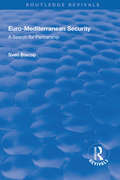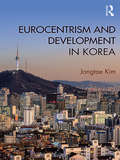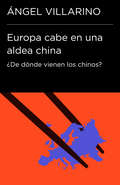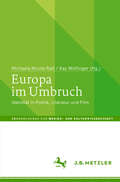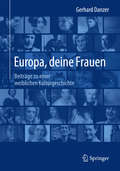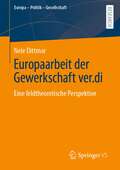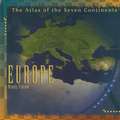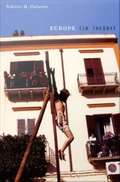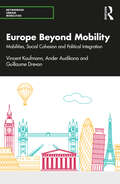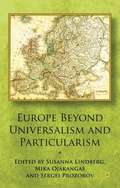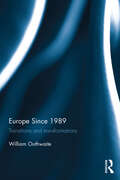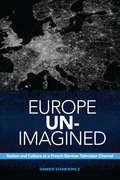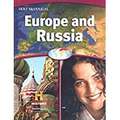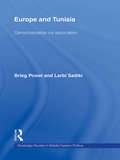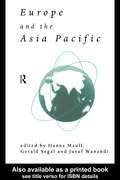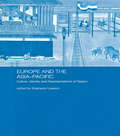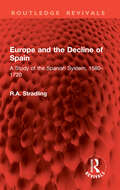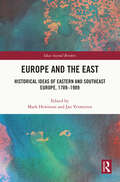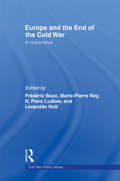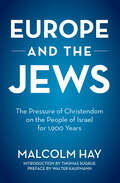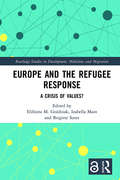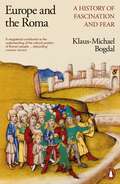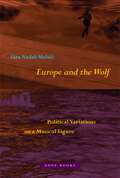- Table View
- List View
Eurasian Slavery, Ransom and Abolition in World History, 1200-1860
by Christoph WitzenrathRecent research has demonstrated that early modern slavery was much more widespread than the traditional concentration on plantation slavery in the context of European colonial expansion would suggest. Slavery and slave trading, though little researched, were common across wide stretches of Eurasia, and a slave economy played a vital part in the political and cultural contacts between Russia and its Eurasian neighbours. This volume concentrates on captivity, slavery, ransom and abolition in the vicinity of the Eurasian steppe from the early modern period to recent developments and explores their legacy and relevance down to the modern times. The contributions centre on the Russian Empire, while bringing together scholars from various historical traditions of the leading states in this region, including Poland-Lithuania and the Ottoman Empire, and their various successor states. At the centre of attention are transfers, transnational fertilizations and the institutions, rituals and representations facilitating enslavement, exchanges and ransoming. The essays in this collection define and quantify slavery, covering various regions in the steppe and its vicinity and looking at trans-cultural issues and the implications of slavery and ransom for social, economic and political connections across the steppe. In so doing the volume provides both a broad overview of the subject, and a snapshot of the latest research from leading scholars working in this area.
Euro-Mediterranean Security: A Search for Partnership (Routledge Revivals Ser.)
by Sven BiscopThis title was first published in 2003. This work provides a clearer understanding of the EU's approach towards security in the Mediterranean. After examining the EU's interests and the potential threats to security in the region, it analyzes EU security policy towards the region as a whole, through the Euro-Mediterranean Partnership, and towards all disputes and conflicts in the area. It recommends opening up the European Security and Defence Policy to Mediterranean participation, in order to establish a deep and equitable security partnership between both shores. The book argues that this way the EU could implement its innovative comprehensive and co-operative approach to security. Rather than focusing on the military aspect alone, this approach takes into account all dimensions of security (political, socio-economic, cultural and ecological) and is based on partnership rather than confrontation. It therefore contrasts quite sharply with the policies advocated in the US National Security Strategy.
Eurocentrism and Development in Korea (Routledge Studies in Emerging Societies)
by Jongtae KimUnder the global hegemony of the West, societies have interpreted the world and defined their identities through the frameworks of Eurocentric discourses. Since the mid-twentieth century, Eurocentrism has tended to be associated with economic developmentalism. The discourse of seonjinguk (developed country) has been a dominant Eurocentric developmental discourse in Korea. However, in what historical contexts have the Koreans set seonjinguk as their national goal and yardstick to judge nations? What roles have been played by the concept of seonjinguk in Korea? What discursive frameworks did the Koreans use for their national identities and worldviews before the developmental era? Eurocentrism and Development in Korea is the first scholarly approach to those questions. Through a chronological analysis of Korea’s dominant discourses from the late nineteenth century to the present, Kim demonstrates the historical nature of developmentalism and seonjinguk discourse for Korea’s developmental era, and traces their genealogy to gaehwa (enlightenment) and munmyeong (civilization) discourses from a sociological historical perspective. Providing essential knowledge about Korea’s history of Eurocentrism, developmentalism and national change, this enlightening monograph will appeal to undergraduate and postgraduate students, as well as postdoctoral researchers, interested in fields such as Korean Studies, Development Studies and Global Sociology.
Europa cabe en una aldea china: ¿De dónde vienen los chinos? (Colección Endebate #Volumen)
by Ángel VillarinoLa historia de los orígenes de los chinos que viven en España. Alrededor del setenta por ciento de los chinos que viven en España proceden de un mismo condado: Quingtian, una región montañosa situada en una de las provincias orientales al sur de Shanghái. Desde hace unas décadas este condado se ha convertido en uno de los lugares más prósperos de China gracias a las inversiones de sus emigrantes, que envían dinero desde España o lo traen consigo al regresar a su tierra natal. Ángel Villarino habla con las gentes de Quingtian y nos cuenta las historias familiares de los emigrantes chinos que encontramos detrás de los mostradores de bazares, peluquerías, restaurantes y otros negocios que han proliferado a lo largo y ancho de la geografía española.
Europa im Umbruch: Identität in Politik, Literatur und Film (Abhandlungen zur Medien- und Kulturwissenschaft)
by Michaela Nicole Raß Kay WolfingerDieser Band zum Begriff „Europa“ beruht auf einer Tagung, die im Winter 2018 in der Carl Friedrich von Siemens Stiftung in München stattfand. Europa in seiner Vielschichtigkeit, in seinem Umbruchcharakter und seiner Faszinationskraft ist von ungebrochener Aktualität. Gleichzeitig ist die europäische Identität durch aktuelle Herausforderungen wie etwa Populismus und Erstarken des Nationalismus gefährdet. Die Beiträge der Tagung gehen der Frage nach, inwieweit die Gegenwartsliteratur und auch aktuelle Filme auf diese Umbrüche reagieren und inwieweit die Rede von einer Krise Europas oder der europäischen Integration in den Bereichen Literatur und Film wahrnehmbar ist. Im historischen Rückblick lässt sich beobachten, dass sich gerade in Destabilisierungs-, Umbruchs- und Krisenmomenten die Intensität des Europa-Diskurses verstärkt und dieser an Komplexität gewonnen hat.
Europa, deine Frauen
by Gerhard DanzerFrauen sind in den letzten Jahrhunderten - ganz bevorzugt in den letzten Jahrzehnten - kulturgeschichtlich viel intensiver und origineller tätig gewesen, als dies gemeinhin wahrgenommen wird. Was genau die kulturhistorischen Dimensionen des ,,Frau-Seins" sind, wird vom Autor differenziert betrachtet und dargestellt. Die Kulturgeschichte würde ohne den Anteil, den diese Frauen daran hatten, ganz anders aussehen. Der weibliche Einfluss ist unverkennbar im Wachsen begriffen und sein Anteil an kulturgeschichtlicher Entwicklung darf nicht unterschätzt werden. Madame de Sévigné - Madame du Châtelet - Johanna Schopenhauer - Rahel Varnhagen - Louise Labé - Elisabeth Barrett-Browning - George Eliot - Marie von Ebner-Eschenbach - Gabriele Münter -Therese Giehse - Melina Mercouri - Pina Bausch - Ellen Key - Maria Montessori - Karen Horney - Astrid Lindgren - Bertha von Suttner - Beatrice Webb- Rosa Luxemburg - Franca Magniani - Margarete Susman - Hannah Arendt - Simone de Beauvoir - Agnes Heller
Europaarbeit der Gewerkschaft ver.di: Eine feldtheoretische Perspektive (Europa – Politik – Gesellschaft)
by Nele DittmarIn der sozialwissenschaftlichen Debatte wird oft ein pessimistisches Bild der Bedingungen und Perspektiven europäischen gewerkschaftlichen Handelns gezeichnet. Selten wurde aber bisher in eine nationale Gewerkschaft hineingeschaut und gefragt, ob und inwiefern die innergewerkschaftlichen (Macht-)Verhältnisse ihre europabezogene Arbeit beeinflussen. Diese Arbeit setzt dort an und lenkt auf der Suche nach den Möglichkeiten und Grenzen gewerkschaftlicher Interessenvertretung in Europa den Blick in eine nationale Gewerkschaft hinein. Am Beispiel der Vereinten Dienstleistungsgewerkschaft ver.di bringt dies einerseits europabezogene Praktiken zum Vorschein, die aus einer Makroperspektive verdeckt bleiben. Andererseits werden neue Erkenntnisse zu Hindernissen gewerkschaftlicher Europaarbeit gewonnen, die in den innerorganisatorischen Strukturen und Machtrelationen selbst begründet sind. Für den Blick in die Gewerkschaft wird in dieser Arbeit eine feldtheoretische Perspektive eingenommen. Damit wird ihre „Europaarbeit“ durch das Zusammenspiel der Position der Gewerkschaft in anderen Feldern (wie dem der deutschen und der europäischen Arbeitsbeziehungen) und den Kräfteverhältnissen innerhalb der Gewerkschaft selbst erklärt.
Europe (Atlas of the Seven Continents)
by Wendy VierowEurope, the second smallest continent on Earth, has 43 countries. Some geographers consider Europe part of a landmass that includes Asia, called Eurasia. Actually, it is a large peninsula, or mass of land that is surrounded on three sides by water. Europe s climate ranges from frozen tundra to warm Mediterranean. The first great civilization in Europe reached its height in Greece about 2,500 years ago. Since then, empires have risen and fallen in Europe. Today, many different ethnic groups call Europe home.
Europe (In Theory)
by Roberto M. DainottoEurope (in Theory) is an innovative analysis of eighteenth- and nineteenth-century ideas about Europe that continue to inform thinking about culture, politics, and identity today. Drawing on insights from subaltern and postcolonial studies, Roberto M. Dainotto deconstructs imperialism not from the so-called periphery but from within Europe itself. He proposes a genealogy of Eurocentrism that accounts for the way modern theories of Europe have marginalized the continent's own southern region, portraying countries including Greece, Italy, Spain, and Portugal as irrational, corrupt, and clan-based in comparison to the rational, civic-minded nations of northern Europe. Dainotto argues that beginning with Montesquieu's The Spirit of Laws (1748), Europe not only defined itself against an "Oriental" other but also against elements within its own borders: its South. He locates the roots of Eurocentrism in this disavowal; internalizing the other made it possible to understand and explain Europe without reference to anything beyond its boundaries. Dainotto synthesizes a vast array of literary, philosophical, and historical works by authors from different parts of Europe. He scrutinizes theories that came to dominate thinking about the continent, including Montesquieu's invention of Europe's north-south divide, Hegel's "two Europes," and Madame de Stal's idea of opposing European literatures: a modern one from the North, and a pre-modern one from the South. At the same time, Dainotto brings to light counter-narratives written from Europe's margins, such as the Spanish Jesuit Juan Andrs's suggestion that the origins of modern European culture were eastern rather than northern and the Italian Orientalist Michele Amari's assertion that the South was the cradle of a social democracy brought to Europe via Islam.
Europe Beyond Mobility: Mobilities, Social Cohesion and Political Integration (Networked Urban Mobilities Series)
by Vincent Kaufmann Ander Audikana Guillaume DrevonMobility, which has represented a critical scientific category and political driver, is currently under strong public scrutiny: has mobility lost its potential for social cohesion and political integration? Europe Beyond Mobility: Mobilities, Social Cohesion and Political Integration assesses this question by focusing on the European integration process, conceptualized as a political project for the promotion of different flows of mobility. Mobility has been a fundamental tool for territorial strength and political integration among European countries. Based on a realistic understanding of the potentials and limits of mobility, this book pleads for a "resonant mobility" in the interest of a renovated European integration process. It examines how, in opposition to those advocating for national borders and mobility restrictions, the EU needs to explore new regulatory models which limit mobility’s adverse social, economic, and environmental impacts and make accessible the benefits of alternative flow models. It also provides an analytical framework for the study of current trends of mobility limitation, migration restriction and re-bordering, and offers a complementary and innovative framework for the study of globalization. Europe Beyond Mobility will be of interest to academics and students as well as policy makers and practitioners internationally in the fields of mobility, migration and border studies.
Europe Beyond Universalism And Particularism
by Susanna Lindberg Mika Ojakangas Sergei ProzorovResulting from an interdisciplinary dialogue between philosophy, political science and International Relations about Europe as a political community this volume rethinks the European political project beyond the rigid opposition between universalism and particularism approaching Europe as a space of the exposure of differences to each other.
Europe Since 1989: Transitions and Transformations
by William OuthwaiteEurope Since 1989 charts the development of Europe east and west since the 1989 revolutions. It analyses the emergent European society, the development of a European public sphere, and civil society. Most books on Europe are heavily biased to the West and Europe Since 1989 takes the opposite approach. It argues that the transformation of the postcommunist world has implications for the whole of Europe and explores the interplay between long-term fundamental tendencies and chance events and the possible futures which confront contemporary Europe. With close attention to political, economic and other social transformations, and an appendix which gives special attention to European macro regions (Nordic/Baltic Europe, Mediterranean Europe), it offers a sociology of Europe with a strong interdisciplinary emphasis.
Europe Un-Imagined: Nation and Culture at a French-German Television Channel
by Damien StankiewiczEurope Un-Imagined examines one of the world’s first and only trans nationally produced television channels, Association relative à la télévision européenne (ARTE). ARTE calls itself the "European culture channel" and was launched in 1991 with a French-German intergovernmental mandate to produce television and other media that promoted pan-European community and culture. Damien Stankiewicz’s ground-breaking ethnographic study of the various contexts of media production work at ARTE (the newsroom, the editing studio, the screening room), reveals how ideas about French, German, and European culture coalesce and circulate at the channel. He argues that the reproduction of nationalism often goes unacknowledged and unremarked upon, and questions whether something like a European "imagination" can be produced. Stankiewicz describes the challenges that ARTE staff face, including rapidly changing media technologies and audiences, unreflective national stereotyping, and unwieldy bureaucratic infrastructure, which ultimately limit the channel’s abilities to cultivate a transnational, "European" public. Europe Un-Imagined challenges its readers to find new ways of thinking about how people belong in the world beyond the problematic logics of national categorization.
Europe and Russia
by Christopher L. SalterThe text covers the history and geography of Europe and Russia. Contains Maps and Resources.
Europe and Tunisia: Democratization via Association (Routledge Studies in Middle Eastern Politics)
by Larbi Sadiki Brieg PowelThis book is concerned with EU democracy promotion inside Tunisia, the first Arab signatory of an Association Agreement with the EU. Focusing on the content, context, mechanisms, and outcomes of democratization via association, the authors examine whether Tunisia’s specific mode of democratization works in tandem with EU democracy promotion objectives, and the extent to which both adapt association in a way that neither sabotages EU democracy promotion nor undermines Tunisia’s specificity. Drawing on Arabic, English and French sources, the book deploys a variety of methods and disciplinary approaches - discourse analysis, interviews, democratization theory, foreign policy analysis, security studies, political history, nationalism and identity – and takes an interpretivist perspective, conceiving of political processes as fluid and tentative. The first comprehensive study of the effects of the Union’s Mediterranean democracy promotion strategy on a single recipient state, this book will be relevant to students of Middle East politics, European foreign policy, Euro-Mediterranean studies, democratization theory, and Euro-Arab relations, this book will also be of great interest to researchers, academics and policy-makers.
Europe and the Asia-Pacific
by Gerald Segal Hanns Maull Jusuf WanandiEurope and the Asia-Pacific is the most wide-ranging and accessible book currently available on the increasingly important relationship between these two regions. Compiled by leading experts, it covers the historical background, contemporary political setting and the vitally important economic aspects of this relationship. Moving on to deal with security considerations and policy decisions it provides valuable insights into the developing partnership between Europe and the Asia-Pacific. Rigorous and up-to-date, it is born out of the work of the Council for Asia-Europe cooperation (CAEC), a body of think tanks that supports the Asia-Europe Summit Meeting (ASEM) process.
Europe and the Asia-Pacific: Culture, Identity and Representations of Region
by Stephanie LawsonThe many points of contact and conflict about culture and identity that exist between Europe and the Asia Pacific are highlighted in this book. This work surveys a variety of issues relating to culture, identity and representation from an interdisciplinary perspective, with contributions from sociology, economics, history, politics, international relations, security studies, museum studies, translation studies and literary and cultural studies. Each brings a different perspective to bear on questions of culture and identity in the contemporary period, and how these relate to the politics of representation.
Europe and the Decline of Spain: A Study of the Spanish System, 1580–1720 (Routledge Revivals)
by R.A. StradlingFirst published in 1981, Europe and the Decline of Spain deals with the slow ebbing of Spanish power, its ‘melancholy, long, withdrawing roar’ during the ‘long seventeenth century’ of pre-industrial Europe. The author looks at the fortunes of Spanish European hegemony from its apogee late in the reign of Philip II to its ultimate failure and dissolution about a century later.The author examines the dynamic spiritual and material resources of Spain as a politico-military system of continental dominance and control. He places the system in a context of continuous general European war, and structures and events in Spain and its provinces are set in this context.A feature of the book is the description of changing approaches to the Spanish system by its major adversaries. This, along with a fresh look at the events themselves, has conditioned a reinterpretation of Spain’s ‘political’ decline which stresses its centrality to an overview of the whole period.
Europe and the East: Historical Ideas of Eastern and Southeast Europe, 1789-1989 (Ideas beyond Borders)
by Mark Hewitson Jan VermeirenThis volume investigates competing ideas, images, and stereotypes of a European ‘East’, exploring its role in defining European and national conceptions of self and other since the eighteenth century. Through a set of original case studies, this collection explores the intersection between discourses about a more distant, exotic, or colonial ‘Orient’ with a more immediate ‘East’. The book considers this shifting, imaginary border from different points of view and demonstrates that the location, definition, and character of the ‘East’, often associated with socio-economic backwardness and other unfavourable attributes, depended on historical circumstances, political preferences, cultural assumptions, and geography. Spanning two centuries, this study analyses the ways that changing ideals and persistent clichéd attitudes have shaped the conversation about and interpretations of Eastern Europe. Europe and the East will be essential reading for anyone interested in images and ideas of Europe, European identity, and conceptions of the ‘East’ in intellectual and cultural history.
Europe and the End of the Cold War: A Reappraisal (Cold War History)
by N. Piers Ludlow Marie-Pierre Rey Frédéric Bozo Leopoldo NutiThis book seeks to reassess the role of Europe in the end of the Cold War and the process of German unification. Much of the existing literature on the end of the Cold War has focused primarily on the role of the superpowers and on that of the US in particular. This edited volume seeks to re-direct the focus towards the role of European actors and the importance of European processes, most notably that of integration. Written by leading experts in the field, and making use of newly available source material, the book explores "Europe" in all its various dimensions, bringing to the forefront of historical research previously neglected actors and processes. These include key European nations, endemic evolutions in the Soviet Union and Eastern Europe, European integration, and the pan-European process. The volume serves therefore to rediscover the transformation of 1989-90 as a European event, deeply influenced by European actors, and of great significance for the subsequent evolution of the continent.
Europe and the Jews: The Pressure of Christendom on the People of Israel for 1,900 Years
by Malcolm HayA detailed and moving account of the indignities and cruelties Jews have undergone at the hands of Christians and others in the West, from St John Chrysostom in the 4th century to Hitler in the 20th. Using Hitler's concentration camps as a point of departure, Hay leads us on a tour of the devilish scenes and spectacles which have been produced by Christian hatred of Jews for some 1900 years.
Europe and the Refugee Response: A Crisis of Values? (Routledge Studies in Development, Mobilities and Migration)
by Elżbieta M. Goździak, Izabella Main, Brigitte SuterThis book explores how the rising numbers of refugees entering Europe from 2015 onwards played into fears of cultural, religious, and ethnic differences across the continent. The migrant, or refugee crisis, prompted fierce debate about European norms and values, with some commentators questioning whether mostly Muslim refugees would be able to adhere to these values, and be able to integrate into a predominantly Christian European society. In this volume, philosophers, legal scholars, anthropologists and sociologists, analyze some of these debates and discuss practical strategies to reconcile the values that underpin the European project with multiculturalism and religious pluralism, whilst at the same time safeguarding the rights of refugees to seek asylum. Country case studies in the book are drawn from France, Germany, Greece, Hungary, Italy, the Netherlands, Poland, Spain, Sweden, and the United Kingdom; representing states with long histories of immigration, countries with a more recent refugee arrivals, and countries that want to keep refugees at bay and refuse to admit even the smallest number of asylum seekers. Contributors in the book explore the roles which national and local governments, civil society, and community leaders play in these debates and practices, and ask what strategies are being used to educate refugees about European values, and to facilitate their integration. At a time when debates on refugees and European norms continue to rage, this book provides an important interdisciplinary analysis which will be of interest to European policy makers, and researchers across the fields of migration, law, philosophy, anthropology, sociology, and political science.
Europe and the Roma: A History of Fascination and Fear
by Klaus-Michael Bogdal‘A magisterial contribution to the understanding of the cultural position of Romani people in Europe. … nothing short of astounding’ Literary ReviewThis remarkable book describes a dark side of European history: the rejection of the Roma from their initial arrival in the late Middle Ages to the present day. To Europeans, the Roma appeared to be in complete contradiction with their own culture, because of their mysterious origins, unknown language and way of life. As representatives of an oral culture, for centuries the Roma have left virtually no written records of their own. Their history has been conveyed to us almost exclusively through the distorted images that European cultures project.Persecuted and shunned, the Roma nonetheless spread out across the continent and became an important, indeed indispensable element in the European imagination. It is impossible to conceive of the culture of Spain, southern France and much of Central Europe without this pervasive Romani influence.Europe and the Roma brilliantly describes the 'fascination and fear' which have marked Europeans' response to the Romani presence. Countless composers, artists and writers have responded to Romani culture and to fantasies thereof. Their projections onto a group whose illiteracy and marginalization gave it so little direct voice of its own have always been a very uneasy mixture of the inspired, the patronizing and the frighteningly ignorant. The book also shows the link between cultural violence, social discrimination and racist policies that paved the way for the genocide of the Roma.
Europe and the Wolf: Political Variations on a Musical Figure
by Sara Nadal-MelsióHow the work of several contemporary artists illuminates and challenges the policing of European borders and identityIn this stunningly original book, Sara Nadal-Melsió explores how the work of several contemporary artists illuminates the current crisis of European universalist values amid the brutal realities of exclusion and policing of borders. The &“wolf&” is the name Baroque musicians gave to the dissonant sound produced in any attempt to temper and harmonize an instrument. Europe and the Wolf brings this musical figure to bear on contemporary aesthetic practices that respond to Europe&’s ongoing social and political contradictions. Throughout, Nadal-Melsió understands Europe as a conceptual problem that often relies on harmonization as an organizing category. The &“wolf&” as an emblem of disharmony, incarnated in the stranger, the immigrant, or the refugee, originates in the Latin proverb &“man is a wolf to man.&” This longstanding phrase evokes the pervasive fear, and even hatred, of what is foreign, unknown, or beyond the borders of a community. The book follows the &“wolf&” in a series of relays between the musical, the visual, and the political, and through innovative readings of artworks—by, among others, Carles Santos, Pere Portabella, Allora&Calzadilla, and Anri Sala. Traversed by the musical, these artworks, as well as Nadal-Melsió&’s writing, present unstable symbolic and material ensembles in an array of variations of political possibilities and impossibilities that evade institutions intolerant of uncertainty and wary of diversity.


